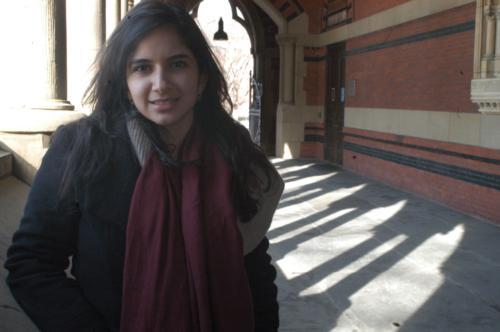
One: A Lonely Number
Every Harvard student knows the freshman week routine. You meet, you shake hands, you ask the usual questions about concentrations, dorms, and roommates. Inevitably, someone asks: where are you from?
For some students, the answer is complicated.
When Melusi A. Dlamini ’10 tells people that he’s from Swaziland, a small nation between South Africa and Mozambique, he’s lucky if they even know the continent he’s from. “Every once in a while,” he says, “though not too often, someone will ask: ‘Is that like Switzerland?’”
This reaction often amuses Dlamini—but he can’t share the inside joke: he has no compatriots at Harvard.
Harvard has a reputation for being one of the most diverse universities in the country. Despite the lack of regional quotas, some places have a higher representation within the college than others. “It varies from year to year, but Boston Latin [School] for the past three years has led the way,” says Dean of Admissions and Financial Aid William R. Fitzsimmons ’67 of the magnet school. To attend the Boston Latin School, one must live within the boundaries of Boston.
But the number of international students at Harvard has been increasing. According to Fitzsimmons, foreign nationals comprise more than ten percent of the Class of 2011. Statistics available on the Harvard International Office (HIO) Web site show that international students represent nearly 100 countries. Of these, about 30 students, like Dlamini, find themselves in the unique position of being the only students at Harvard from their countries.
THE POWER OF ONE
David M. Sengeh ’10 is a native of Sierra Leone. Like Dlamini, he is the only student at Harvard from his county. Students may recognize this West African nation thanks to Leonardo DiCaprio and his recent role in “Blood Diamond.” But Sierra Leone is no longer the country portrayed in the movie, which suffers from some dated information. “Many think there’s still a civil war going on,” Sengeh says. “I have to tell them that it ended several years ago.”
Although these students may not come to Harvard intending to act as representatives of their countries, they often find themselves in the position of educators. Near the end of last semester, Sengeh founded the Harvard College Sierra Leone Initiative (HCSLI) for the purpose of educating and increasing awareness of Sierra Leonean issues on campus. In April, Sengeh says that he plans to hold a panel discussion with key players involved in Sierra Leone’s independence and development.
Harvard students are not the only ones benefitting from HCSLI, whose Web site references the greater possibility of cultural exchange. In the “About Us” section, HCSLI writes: “We also know that such interaction will alter the experiences of Harvard students in a way classrooms cannot. The win-win situation for both the students and the locals in Sierra Leone cannot be overstated.”
Such a statement points out the fundamental truth of all cultural exchange—that it is by definition a two-way street, a “win-win situation.”
ONE WAY OR ANOTHER
It’s Thursday night, and the halls of Winthrop House resound with the sounds of Brazilian percussion. Members of the Woodbridge Society of International Students stand in a circle, playing a wide variety of instruments. After a hour of jamming, they break for a catered Brazilian dinner. Over black beans and rice, Mashael A. Fakhro ’11 talks about adjusting to Cambridge after leaving her home in Bahrain (for those who don’t know, Bahrain is an island in the Persian Gulf).
“I didn’t need to explain myself so much over there,” Fakhro says. Here at Harvard, however, she finds herself fielding questions about her Arab heritage and the location (or existence) of her country.
Despite being the lone Bahraini at Harvard, Fakhro doesn’t feel alone. Several organizations at Harvard cater to the international community. The Woodbridge Society, with its many cultural and social events, provides a place for international students to connect—even if you are the only student from your country. HIO for its part assists with the more mundane challenges that internationals face in Cambridge. According to Dlamini, the HIO also helps students open bank accounts, pay taxes, and obtain passports.
“They do a very good job of taking care of you here,” Dlamini says.
Residential life also fosters a strong sense of belonging outside the international community. “It’s freaking cold in Cambridge,” Sengeh says, “but at least Currier House is a friendly place.” Several fellow Currierites stop to chat with Sengeh as he sits outside the dining hall.
And being so far away from home has its own small, practical problems. “Sometimes you really miss mom’s cooking,” says Dlamini.
Luckily, thanks to several sizeable ethnic populations in the Boston area, it’s possible for students of many backgrounds to find a decent restaurant or grocery store which meets their needs. But some international students don’t have this luxury. Often, it’s more than a matter of just finding a good cook of your homeland’s cuisine—some of the ingredients are impossible to find in Massachusetts.
When Sengeh craves traditional Sierra Leonean food, he gets resourceful. “I have an aunt in Houston who sends me food sometimes,” Sengeh says. “So it’s bearable.”
All college students leave home to find themselves in a new, often strange, places. But students like Sengeh, Dlamini, and Fakhro, find themselves in a unique situation. As the only students from their respective countries, they encounter their own set of challenges. But they have the singular opportunity to introduce a culture and a point of view that no other Harvard student can provide. Luckily, the Harvard student body is receptive.
“People here actually care about your background and always want to learn more,” Dlamini says. “You’re not easily going to find that interest outside of the school.”
—Aditi Balakrishna contributed to the reporting of this story.


